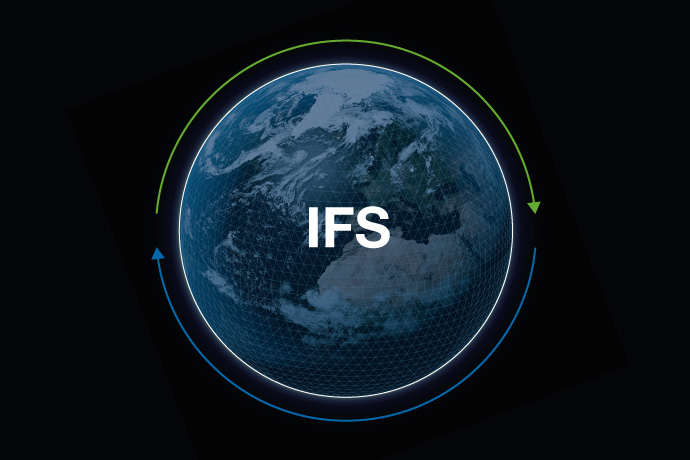
Weather forecast and climate
The Integrated Forecasting System (IFS) is a state-of-the-art global weather prediction suite developed jointly by the European Centre for Medium-Range Weather Forecasts, on behalf of its member states, and Météo-France. It is a computational representation, or “digital twin”, of the Earth, including the systems relevant to weather prediction. This includes the fluid dynamics and physics of the atmosphere, but also the ocean interior, the ocean surface waves, the cryosphere, and the land surface. It forms the basis of ECMWF’s daily weather prediction suite, running on time scales from the medium range (15 days) to the seasonal range (months). Global forecasts produced by the IFS are often the most accurate in the world.
The most important part of the IFS, from a computational perspective, is the atmospheric component. The IFS atmosphere comprises a spectral transform dynamical core with semi-Lagrangian timestepping and a comprehensive physical parametrisation suite. It employs a hybrid parallel design, with domain decomposition across MPI tasks and OpenMP multithreading within tasks. Other components include the ocean and sea-ice component, fulfilled by the external model NEMO, and the ocean surface wave model WAM. All of these components are coupled together and execute sequentially throughout the course of a model integration. The IFS software suite contains the source code for the model components, written primarily in modern Fortran, but also many open-source dependencies for handling I/O, expensive computational kernels, regridding, and more.
More recently, the IFS has been adapted for running on many different computational platforms. Benchmarks have been carried out on many of the largest supercomputers including Fugaku, Frontier, LUMI, Leonardo, and Summit. Further work to break apart and modularise the monolithic source code into individual model “dwarfs” have allowed the IFS to be considered as a standard weather forecasting benchmark case for many computational science projects. For the DEEP-SEA project, work has focused firstly on the coupling aspects of the IFS: how the atmosphere and ocean components advance forward and communicate with each other. This is a strong candidate application for the Modular Supercomputing Architecture concept developed during the DEEP project series, but this requires a more flexible relationship between the two components than what currently exists. Other work has focused on optimisation cycles as part of DEEP-SEA – frameworks for targeted profiling and optimisation of certain aspects of an application using a standard set of tools. We have been investigating ways to minimise the energy consumption of the IFS by dynamically scaling the CPU frequency without affecting the speed of the model. We have also been investigating the memory performance of the spectral transform module used by the IFS, provided by the open-source library ecTrans.


